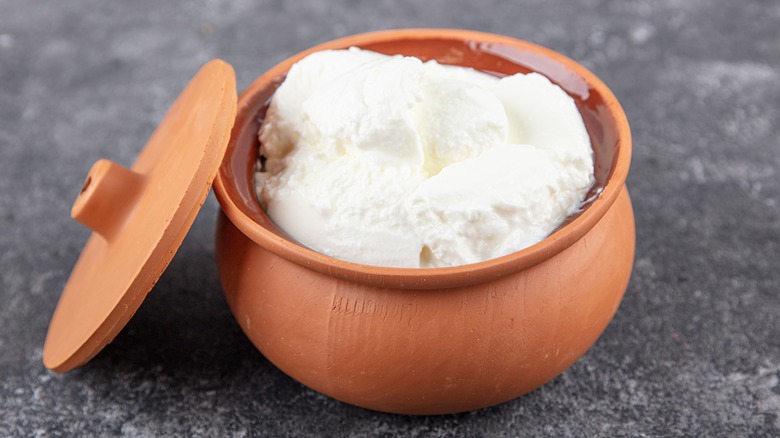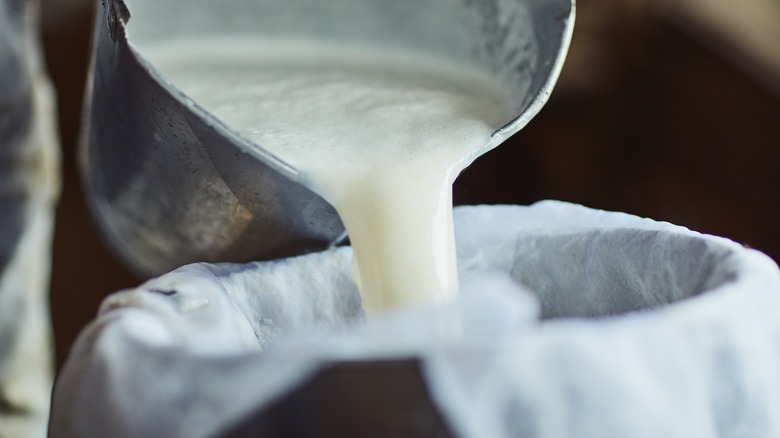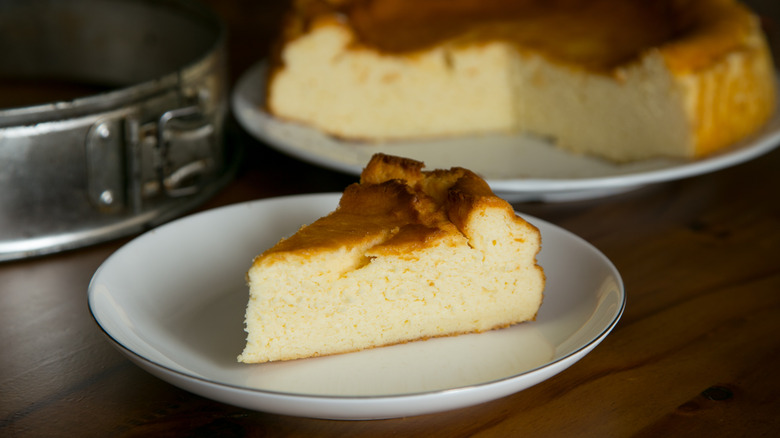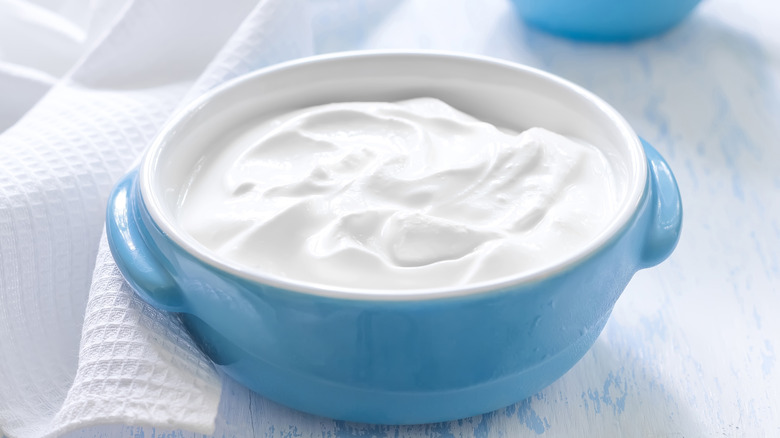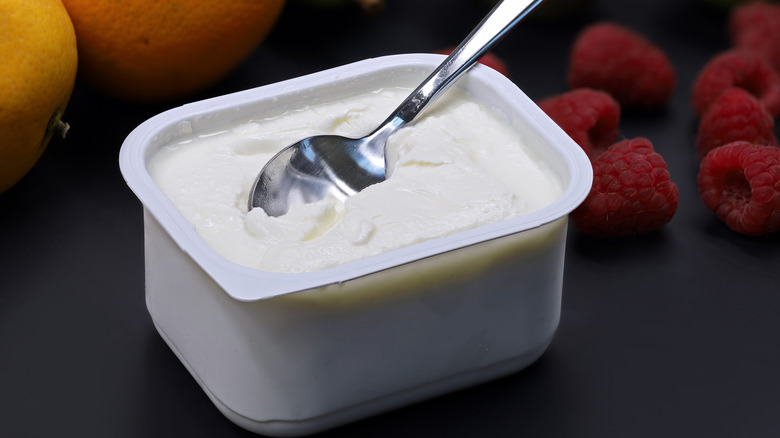Quark: The Soft Cheese Product That's Sometimes Confused With Yogurt
Can you imagine a world without cheese? For many, the mere thought is alarming at best and heartbreaking at worst. In many countries across the globe, cheese is as much a part of the culture as it is an incredibly delicious and satisfying food. Experts estimate that cheese was discovered around 4,000 years ago by accident (as many beloved foods were). Legend has it that an Arabian merchant transported some milk through the desert in a sheep's stomach that he used as a pouch. The rennet from the stomach and the heat of the sun caused the milk to curdle and the merchant found that the solid curds were good for eating, thus, being the first person on earth to discover cheese.
Since that fortunate day, all corners of the world have created cheese from different kinds of milk and in various textures and flavors. While many of them are familiar to the moderate cheese fan, chances are they haven't even scratched the surface of what there is to know about cheese. Today, there are over 1,800 kinds of cheese in existence ranging from the prominent — like bries, blues, and cheddars — to unique cheeses like Swedish moose cheese and North African camel milk cheese. While gaining popularity in the United States, a little-known cheese called quark is still far from a household name. Typically sold in small tubs, quark is bright white, creamy, and looks a lot like yogurt, but it's actually a unique type of cheese.
What is quark, and how is it made?
Pronounced "kwark," quark is technically a soft cheese product that is rooted in Eastern Europe and Germany where it is still found and used in abundance. Also known as dry curd cheese and farmer's cheese, it is made like any other cheese with milk being warmed until it curdles, with the liquid whey strained off. The resulting curds are smooth — but not as smooth as yogurt — yet not as stiff as something like cream cheese. Some might even say that the texture is somewhere between cottage cheese and fresh ricotta. It is spoonable, spreadable, and has a flavor that is unlike any other cheese.
It is certainly not as salty as cottage cheese and doesn't have the trademark high tang of yogurt. The tartness of quark depends on how long it was processed. To make quark, pasteurized cow's milk is combined with lactic acid bacteria and rennet (an enzyme that aids in coagulating milk). The mixture is warmed (but not boiled) until small, solid masses form, or curdles. Once this happens, the solids are separated from the liquids; it is the solids that comprise the finished quark cheese. Quark isn't aged but, rather, sold as a fresh cheese product. Sometimes, cream is added to the quark if a higher fat content and sweeter flavor is desired.
How quark tastes, and its uses
Unadorned and served plain, quark has a very mild and subtle flavor. It is neither too sweet nor too tart and, because of this, it can be used in both sweet and savory dishes. In German and Eastern European cuisine, it makes an appearance in breakfast, lunch, and dinner dishes. It can be topped with granola and fruit and eaten for breakfast or spread on toast and bagels. Mixed with spices and chopped vegetables, quark makes for a flavorful and creamy dip. It is perfect as a cheese filling in such dishes as ravioli, crepes, and pierogis. In traditional sweet Polish pierogis, quark, or twaróg, as the Polish call it, is mixed with sugar and sometimes fruit.
Quark can even be used to substitute cream cheese or mascarpone in desserts like cheesecake, with the resulting sweet being lighter and fluffier. Traditional German cheesecake called käsekuchen starts with a simple pastry used for the crust. The filling is a mixture of quark, sugar, eggs, vanilla pudding powder, and other ingredients. It is baked and cooled just like New York cheesecake before serving. Try it with a glass of champagne for a delicious wine and cheese pairing.
Nutritional information about quark
Nutritionally, quark is much healthier than a number of other cheeses in the world. This doesn't mean it's going to make your cheesecakes completely diet-friendly, but on its own, quark is low in calories and high in protein and calcium. Quark contains about 12 grams of protein per 100-gram serving, which will fill you up quickly without a lot of fat. This makes it healthier than the dairy darling, Greek yogurt, which has 7 grams of protein in the same serving amount, according to dietitian Joe Leech. The calcium in it is great for healthy bones, teeth, and hair, while vitamins A and B are good for eye health and nervous system health, respectively.
There is a low amount of carbohydrates in quark, and the low sodium level makes it a good choice for anyone watching their salt intake or blood pressure levels. A 100-gram serving of quark contains just 40 milligrams of sodium compared to 406 milligrams in cottage cheese and 307 milligrams in ricotta cheese. Quark happens to be a cheese that many people with lactose intolerance can, well, tolerate because it's naturally very low in lactose compared to other cheeses and dairy products.
Where to find quark
If you live in Germany or an Eastern European country, you're probably accustomed to seeing quark anywhere you buy food or dairy products. It is found all over Europe these days, but not so much in the United States. Even though some companies make quark in America, it is still not widely distributed. Your best bet might be German delicatessens, European bakeries, and gourmet food stores. Be aware that the cheese may be labeled as "dry curd cheese" or "farmer's cheese," as can be seen at stores like Whole Foods. Of course, online shopping is usually a reliable option, with places like S&D Polish Deli in Pittsburgh offering and shipping farmer's cheese.
Those comfortable in the kitchen may just want to make their own quark. The Daring Gourmet outlines a homemade quark recipe that results in the kind of thick, creamy versions you would find in Europe. It does involve some specific cheesemaking ingredients that you'll probably have to purchase online like rennet and mesophilic culture, but the process isn't terribly difficult — it just takes some time. Plus, you'll feel like a legit cheesemaker! You'll be on your way to some delicious, quark-based dishes in no time.
